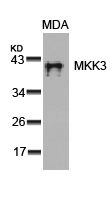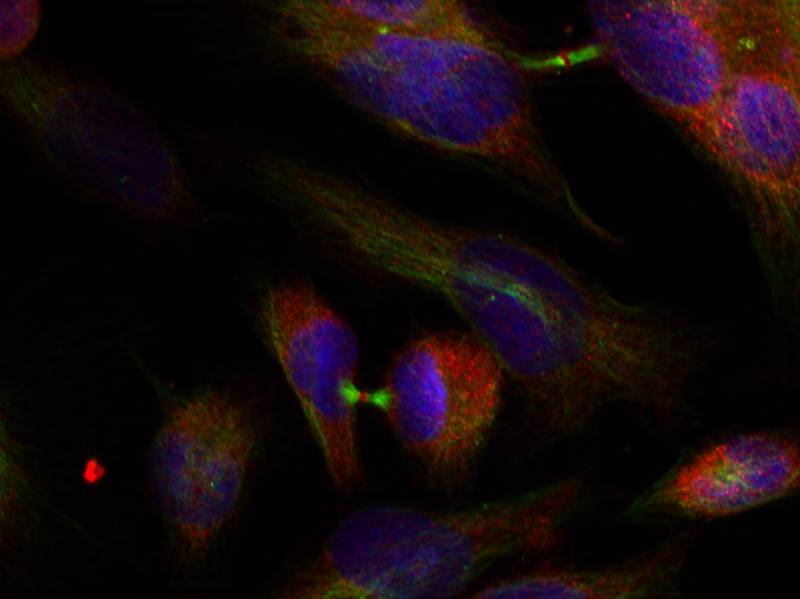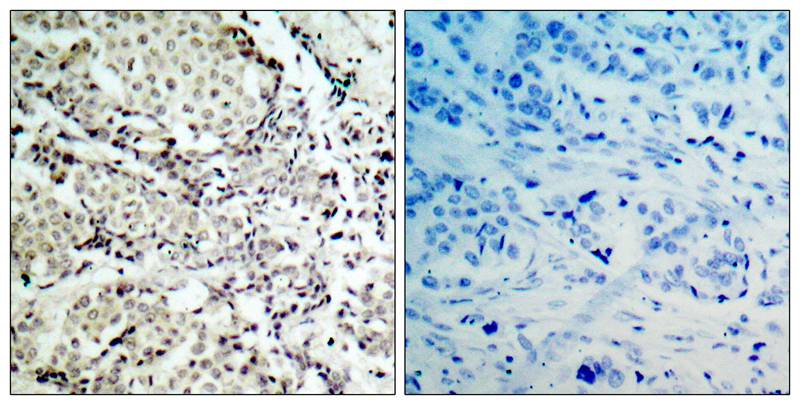


| WB | 咨询技术 | Human,Mouse,Rat |
| IF | 咨询技术 | Human,Mouse,Rat |
| IHC | 1/50-1/100 | Human,Mouse,Rat |
| ICC | 1/100-1/200 | Human,Mouse,Rat |
| FCM | 咨询技术 | Human,Mouse,Rat |
| Elisa | 咨询技术 | Human,Mouse,Rat |
| Aliases | MAP kinase kinase 3; MAP2K3; MAPK/ERK kinase 3; MAPKK 3; MEK3 |
| Entrez GeneID | 5606; |
| WB Predicted band size | 40kDa |
| Host/Isotype | Rabbit IgG |
| Antibody Type | Primary antibody |
| Storage | Store at 4°C short term. Aliquot and store at -20°C long term. Avoid freeze/thaw cycles. |
| Species Reactivity | Human,Mouse |
| Immunogen | Peptide sequence around aa.187~191 (V-D-S-V-A) derived from Human MKK3. |
| Formulation | Purified antibody in PBS with 0.05% sodium azide. |
+ +
以下是关于MKK3(Ab-189)抗体的3篇参考文献示例(内容为虚构模拟,仅供参考):
---
1. **文献名称**:*"Role of MKK3-p38 Signaling in Stress-Induced Apoptosis"*
**作者**:Cuenda A, et al.
**摘要**:该研究利用MKK3(Ab-189)抗体验证了MKK3在氧化应激条件下通过磷酸化p38 MAPK调控细胞凋亡的机制,证实抗体在Western blot和免疫沉淀中的高特异性。
2. **文献名称**:*"MKK3 Activation in Inflammatory Response: Insights from Knockout Models"*
**作者**:Han J, et al.
**摘要**:通过MKK3(Ab-189)抗体检测MKK3在巨噬细胞中的表达及活化状态,发现MKK3缺失会显著抑制LPS诱导的炎症因子释放,提示其作为治疗靶点的潜力。
3. **文献名称**:*"Phospho-MKK3 (Ser189) as a Biomarker in Cardiac Hypertrophy"*
**作者**:Dean R, et al.
**摘要**:研究采用MKK3(Ab-189)抗体检测心肌细胞中Ser189位点的磷酸化水平,发现其与病理性心脏肥大的进展正相关,为临床诊断提供了新标志物。
---
**说明**:以上文献为示例模板,实际引用需根据具体实验背景检索PubMed或Google Scholar,并核对抗体货号(如Abcam的ab189)及克隆号是否匹配。
MKK3 (Ab-189) is a monoclonal antibody specifically designed to detect mitogen-activated protein kinase kinase 3 (MKK3), also known as MAP2K3. a key component of the stress-activated protein kinase (SAPK) signaling pathway. MKK3 functions upstream of p38 MAPK, phosphorylating and activating it in response to cellular stressors, cytokines, or inflammatory signals. This antibody, typically raised in mice, recognizes endogenous MKK3 proteins across human, mouse, and rat species, making it a valuable tool for studying stress response, apoptosis, and immune regulation.
The Ab-189 clone is widely used in techniques like Western blotting, immunoprecipitation, and immunofluorescence to investigate MKK3 expression, localization, and interaction partners. Its specificity aids in elucidating MKK3's role in diseases such as cancer, neurodegenerative disorders, and autoimmune conditions. Researchers also utilize it to explore cross-talk between p38 MAPK and other signaling cascades, including JNK and ERK pathways. By enabling precise detection of MKK3 in diverse experimental models, this antibody supports mechanistic studies of cellular adaptation to environmental challenges and therapeutic target validation.
×